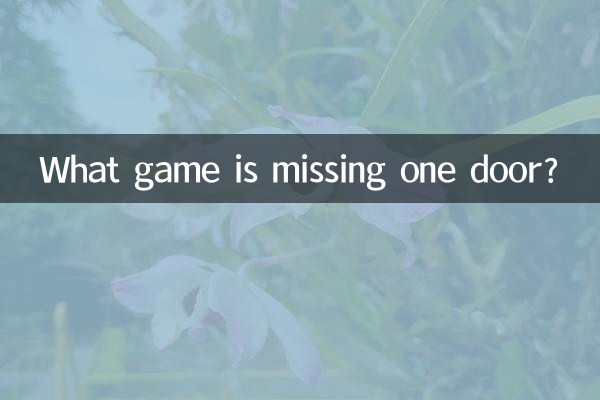Title: What game is missing one door?
Among the hot topics on the Internet in the past 10 days, the popularity of content related to traditional culture and casual games continues to rise. Among them, "Missing One Door", as a game with a strong cultural background, has triggered extensive discussions. This article will analyze the definition, gameplay rules, cultural background and recent popularity data of "Missing One", and present relevant content through structured data.
1. Missing the definition of a game

"Qui Yi Men" is a traditional card game originated from Chinese folk and is mainly popular in North China. The name of the game comes from its core rules - players need to actively "lack" cards of a certain suit to form a unique competitive strategy. The game is usually played using mahjong tiles or special playing cards. The gameplay is simple but strategic, and is very popular among middle-aged and elderly people.
| Game properties | Specific content |
|---|---|
| game type | traditional card games |
| Number of players | 2-4 people |
| Use cards | Mahjong tiles or special playing cards |
| Popular areas | Mainly in North China |
| cultural origin | Chinese folk traditional culture |
2. Basic rules of the game
The core gameplay of missing a suit is that players need to choose a suit that is "missing" before the game starts, and cards of that suit cannot be used in subsequent games. The specific rules are as follows:
| Key points of the rules | Detailed description |
|---|---|
| Selection stage | Before the start, each player must declare the missing suit (thousands, strips, tubes, etc.) |
| Card restrictions | The declared missing suit cannot be used, eaten, touched or kongned in the game. |
| Determination of victory or defeat | The first player to form a specific card type wins |
| Special card type | All-color, seven-pair card types can get extra points |
| Violation penalties | Using a missing suit will result in penalty points and other penalties |
3. Recent Internet Popularity Analysis
Through the monitoring of the entire network data in the past 10 days, it was found that topics related to "Missing a Course" mainly appeared on the following platforms:
| Platform name | amount of discussion | main topics |
|---|---|---|
| Douyin | 125,000 | Game teaching videos, practical skills |
| 83,000 | Traditional cultural protection, game competitions | |
| Station B | 56,000 | Game historical research and rule analysis |
| Zhihu | 32,000 | Strategy discussion, comparison with other card types |
| little red book | 28,000 | Recommended leisure and entertainment options |
4. Cultural value and social significance
The missing game is not only a form of entertainment, but also carries rich cultural connotations:
1.Traditional culture inheritance: The rules of the game reflect the philosophical thought of "making good choices" in traditional Chinese culture.
2.intellectual development: Players are required to perform probability calculations and strategic planning, which helps to keep their minds active.
3.social function: Provides important social scenes and communication topics for middle-aged and elderly people.
4.intangible cultural heritage: Some areas have included it in the intangible cultural heritage protection list.
5. Game development trends
Judging from recent popularity data, the Queyimen game shows the following development trends:
| trend direction | Specific performance | growth rate |
|---|---|---|
| Rejuvenation | The proportion of players aged 20-35 has increased | +18% |
| Digitization | Online platform game version increased | +25% |
| Competitive | Increase in local events | +15% |
| internationalization | Overseas Chinese communities become popular | +12% |
Conclusion
As a typical representative of traditional Chinese games, Queyimen has taken on new vitality in the context of the current revival of traditional culture. Its unique game mechanism and cultural connotation make it not only a form of leisure and entertainment, but also an important carrier to connect intergenerational emotions and inherit cultural memories. With the development of digitalization and youth trends, I believe this game will attract more people’s attention and participation.

check the details

check the details